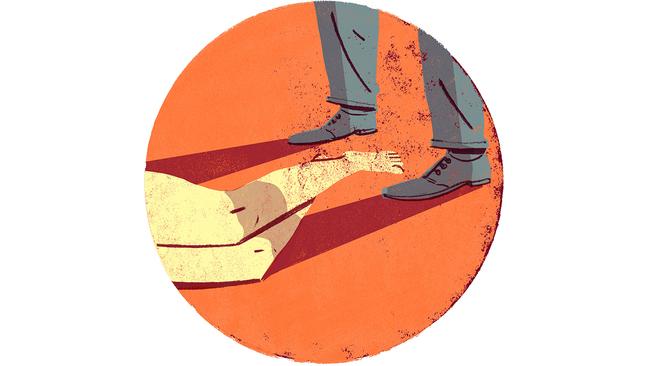Germaine Greer on rape, consent, misogyny and the law
The time has come to reconsider a crime whose definition has fundamentally changed.

What is rape? The Istanbul convention on preventing and combating violence against women states that non-consensual sex is rape. The convention, which aims to “end the impunity of perpetrators”, was convened by the Council of Europe and opened on May 11, 2011; Britain helped to draft the text and 32 nations have ratified it, but Britain has not. The object of the exercise was to establish international norms to deal with the ramifying issue of gender-based violence but, despite the expenditure of hundreds of hours by serried ranks of experts, the nomenclature of crimes against women continues to diversify and confound. The most contentious area of all remains the issue of rape.
Popular sexologists, such as published author Janine White, insist: “Any time someone has sex with another person without their consent, it’s rape.” So if a man continues having sex with a woman who has fallen asleep, he is raping her. Just what the position is if she is only half-asleep is beyond conjecture. In the world of anti-rape agitation, consent is absolute. Experts answering queries online tell us that a sleeping woman is incapable of consent, hence sex with her is rape unless she has previously registered her consent to all acts of sexual penetration whether she is awake or asleep. There are some who will say that used to be what a woman signed on for when she got married.

Most people don’t think of rape as co-extensive with non-consensual sex. Juries are required to make their judgment of a case using the everyday meaning of the words used. The word rape still carries its old meaning of the violent grabbing and carrying off of a woman who belongs to other men. British politician George Galloway is an educated man, but even he thought that to call all non-consensual sex rape was to empty the bad old word of all significance. The only way to keep the bad old word is to endow it with a consistent meaning, which is how we get to the present position that rape is to be defined as non-consensual sex. Stranger rape is the rarest kind but it is the most likely to result in prosecution; partner rape is the commonest kind and it hardly ever does. This contrast is not only intolerable; it has resulted in miscarriages of justice on a spectacular scale.
Underlying our confusion is a semantic residue lurking in the word rape itself. Number-crunchers tell us that approximately nine million women in Europe testify to having been raped as adults; that is, after the age of 15. Given the adult female population of the EU is somewhere in the region of 220 million, if 211 million of them have never experienced non-consensual sex this would appear to be a triumph. If only sexologists’ statistics didn’t tell us that 46 per cent of women fake orgasm every time they have sex. (Needless to say, all such statistics are as soft as butter.) Women fake orgasm when they are tired or bored; uttering little animal cries, first stipulated by DH Lawrence, usually puts an end to the business, without causing offence.

Feminists have been accused of saying all men are rapists; the truth seems to be that a certain very dangerous kind of man uses his sexuality as a weapon to degrade and destroy women. The vast majority of men have no desire to do that, but that doesn’t mean they are truly concerned as to whether their female partners welcome their attentions. That might be thought to suggest that we should differentiate between “vicious rape” and perfunctory sex. Perfunctory sex is not criminal but it is damaging. Neglect and indifference from a loved one are far more corrosive of self-esteem and ultimately more spiritually damaging than a random attack from a stranger, however violent.

Rape used to be defined as penetration of the vagina of an unwilling female by an unsanctioned penis. For no good reason, in many jurisdictions the crime was de-gendered. The vagina became any bodily orifice and the offending member could be any object or any body part. The crime of forcible buggery was redefined as “male rape” — as if women did not have rectums and could not be forcibly buggered. The devaluing of the vagina is a desecration; when the vagina could not be rendered a safe playground for the penis, when impregnation was always a possibility, it was approached with awe. Wooing took longer; foreplay was the norm. Now we do role-play to make intromission less banal.
The vagina having been downgraded to the status of the rectum — or the nostril — the penis became weaponised. A penis is a vulnerable thing that can be easily hurt. A scratch with a fingernail can be enough to discourage the most determined member. The toothed vagina that turns up in the folklore of communities around the world is another name for the female mouth; a good, hard bite on an intruding penis will cause an immediate reaction, as one man found out in a case reported from South Africa in January. A misdirected or mishandled erect penis can actually break. Penetration of the vagina by a bottle or a broomstick is a far more vicious attack than the introduction of an unwanted penis but it is usually categorised as the lesser offence of sexual assault.

Current discussion of the issue of consent insists there is nothing mysterious about it. Every woman is supposed to know whether she is consenting to whatever is going on. Before entering into “sex” she is now expected to declare that she consents, and not grudgingly but enthusiastically. There is even an app for her to record this in her phone. She may withdraw this consent at any time — if she can find her phone, and if it has any battery power left.
And what of the woman whose partner comes home from the pub and starts pulling her about? In the morning she has to get kids off to school and herself to work and figures she might as well give in as opposed to wasting precious sleeping time fighting him off. Giving in is not consenting.
What about the actor who, when told that if she has sex with the producer she will get a part in his movie, goes for it and then doesn’t get the part? Was her consent conditional? Is it negated by the fact that he lied? Or did he simply change his mind? Was their tumble in the hay a version of a screen test?

The accused cannot be made to inculpate himself and need provide no supporting evidence for his defence. It is his victim who will provide the evidence for his defence, either from what she says under cross-examination, or to her mates via social media, or because a detective employed by the defence tracks her and records her behaviour in other places with other people.
The judge will advise jurors that they need not doubt the evidence of the rape survivor in order to believe the defendant. The protesters who carry slogans saying they believe women who allege rape are missing the point. The jurors may believe her, too, but they may also believe the defendant. If they think there is a sliver of doubt, they cannot find the defendant guilty. If this is not made clear to them in court, the defendant has a claim for a mistrial.
To attempt to discuss the issue of rape in the context of criminal prosecutions is to adopt the sensationalist priorities of the media. Most rapes are unreported; very few domestic rapes ever appear before a tribunal of any kind, unless you count those occasions when women get together to moan about the sex they have with their partners. It is not so long ago that a married woman could not complain of her partner’s lack of consideration because her duty was to satisfy her husband, whether she liked it or not. To judge from the desperate accounts that appear online, many women still understand that to be the case.

It surely cannot be right that non-consensual sex is occurring daily uphill and down dale, with most of the men involved getting away with it scot-free, while those very few men who are tried and convicted are sent away for enormous lengths of time. The recent outcry about the acquittal of the charge of rape for the five men who assaulted a young woman in Pamplona on July 7, 2016, made no mention of the sentences passed by the judge for the lesser crime of sexual assault. Each of the five were sentenced to nine years plus a payment of €10,000 to the complainant. The judge cleared the men of the charge of rape because Spanish law stipulates that violence and physical constraint must be involved for the offence to be rape. Because the young woman did not fight or scream, the judge found the perpetrators guilty of the lesser charge of sexual assault. Further outcry has now ensued because the five men have appealed and have been released from prison awaiting the hearing of the appeal. The appeal relates to their having been accused of one crime — for which they had prepared a defence — only to be convicted of another, for which they were unprepared.
It may be practically impossible for a literate man who is well represented by a competent barrister to be convicted of rape, but such is not the case when the accused man is a member of a racial minority and without social status. Ashraf Miah, who is serving nine years in jail, to be followed by four years on extended licence and deportation, is a 34-year-old illegal immigrant who made his living working as a delivery man for Bangladeshi restaurants. He had been in England 11 years, 10 of them illegally after his original work permit expired, when at 2am on September 20, 2016, the homeless Miah attacked Lillian Constantine on her way home from a pub in Ramsgate.
She had been using her mobile phone as a torch because, in an economy drive, the local council had turned off the street lights. When Miah grabbed her she turned on the camera. When she told him she was videoing him and he did not desist, she decided “he was an absolute maniac”. Miah was never tried for rape; instead he pleaded guilty to attempted rape, sexual assault without penetration and sexual assault with penetration. No match was found for his DNA in the national database, but it was given in evidence that he had approached another woman earlier in the evening.
The video was grainy; some press reports said the recording was two minutes and 47 seconds long; others that it was 90 seconds.
Constantine’s screaming at Miah alerted others living on what was a residential street and frightened him off. Did he have any idea of the sentence he was likely to get when he pleaded guilty? Did he understand the alleged offences?
One aspect of the case is particularly disturbing. Press reports repeatedly referred to Miah as a “vile” man; in fact, after 10 years of what might have been slavery, he was unknown to the police. If we compare what was said about him to the press treatment of the so-called Belfast Four — a group of men who earlier this year were acquitted of rape, although they clearly had brutally abused a young woman by making her submit to an ordeal in which she was penetrated anally and orally — we can see how much more vulnerable the homeless man was.
The Belfast Four were supposed to have survived their sensational trial in March this year “without a stain on their character”. The court of public opinion held otherwise, and the four are pariahs. Studies of the behaviour of juries in rape trials reveals they are likely to base their interpretation of the evidence on their own impressions of the characters of both complainants and defendants. The collected experience of the Innocence Project, set up in 1992 to review cases of possible wrongful convictions in the US, shows that 70 per cent of the individuals found to have been wrongfully convicted are members of minority groups.
The law of rape is unworkable. It cannot be made workable by removing the civil rights of the defendants or by removing the defence that they believed the complainant consented to their behaviour, however brutal. Defendants will not be protected by anonymity either because when this was tried in Britain in the 70s the police found they could not pursue their investigations without identifying the persons they were investigating. A raped woman may be told she has a moral duty to take her case to the police, if only to protect other potential victims of the man she is accusing, but when securing a conviction is practically impossible despite the intrusions and humiliations to which she has been subjected, the months-long ordeal is only too likely to prove counter-productive, as it did for the victim in the case of the Belfast Four.
Rape is a hate crime. Its motivation is embedded in the inculcation of masculinity, which is every bit as much a matter of conditioning as the inculcation of femininity. As a boy approaches puberty, he enters into a culture in which the mother has no place. His mother’s milk is to be driven out of him, as he strives for acceptance in his peer group. He will be subjected to trials and initiations, he begins to identify with particular groups, becomes a football supporter and must remain loyal to his club for life, shares in transgressions that serve as bonding mechanisms. He may eventually enter the corporate world, where his masculinity is tested every day. He is expected to have a female sexual partner but not to give her power over him. If he shaves, he will shave before going to work, not before making love.
Masculine culture requires that a man not give his female partner precedence over the men in his life. He is supposed to take her for granted, so he does. His jokes are supposed to make his mates laugh, not her. When you read this testimony to an online chatroom, what you are reading about is rape as a way of life:
My husband got to where he was only nice/kind to me 30 seconds before sex and 2 or 3 minutes after. Add the 30 seconds it took to have the same exact routine sex from foreplay to finish and it added up to less than 5 minutes of kindness. I kept trying. I know it’s important for men. But he kept getting meaner and meaner and forgot about a compliment or any appreciation.

To read in the same post — “I’m attracted to my husband and I love him” — is truly heartbreaking. This is the empty heartscape of dreary daily domestic rape. We will not fix the appalling misogyny of our legal systems until we deal with the downgrading and belittlement of women in their most intimate relations. We need to address the underlying problem: men’s indifference to women’s feelings.
Germaine Greer’s On Rape, published by Melbourne University Press ($14.99), is due for release on September 3. Greer, in association with The School of Life, will speak about consent in Sydney on September 5 and Melbourne on September 6.
www.theschooloflife.com/sydney/events/major-events/germaine-greer-on-consent/



To join the conversation, please log in. Don't have an account? Register
Join the conversation, you are commenting as Logout